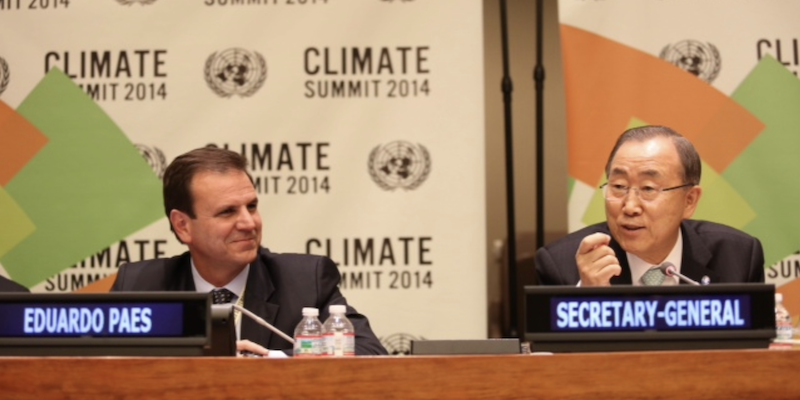How to Leverage National Assets for City Diplomacy
Congress may be the best place to go to advocate for an office at Foggy Bottom dedicated to local and state governments.

City diplomacy — the activity of engaging with foreign counterparts by city and local governments to achieve transnational goals — seemed to be all the rage a couple of years ago. Think-tank experts and university professors rushed to produce research, and the Chicago Council on Global Affairs conducted a much-cited survey on the subject in 47 cities. The survey’s conclusion was that “cities maintain a strong commitment to global agendas, and international frameworks are increasingly influential in municipal affairs.”
The survey added, however, that cities “lack the necessary formal diplomacy training and resources for conducting that engagement to maximum effect.” The solution seems obvious: leveraging national assets for the benefit of city and local governments, which can then conduct diplomatic activities that contribute to the national interest.
Sure, that’s easier said than done, but there is reason for hope. Some of the largest cities in the United States and around the world have forged a good head start, having emerged as leaders in transnational change despite the limitations in their diplomatic capacity and their lack of constitutional authority in foreign affairs. “Urban centers already produce more than 70 percent of global GDP, consume close to 70 percent of the world’s energy and produce more than two-thirds of its greenhouse gas emissions,” David Koranyi, senior adviser on city diplomacy to the mayor of Budapest, wrote in March. He pointed out that “city leaders are less driven” by political ideology and more focused on “pragmatic solutions” than national politicians. “Mayors are usually well connected to the fabric of their local communities and have higher approval ratings,” he added.
Sohaela Amiri and Rafiq Dossani of the RAND Corporation agreed that local governments are “nimbler” than their national counterparts “in their response to certain global challenges, such as climate change or pandemics,” which could boost their credibility. They noted in 2019 that several U.S. cities, including New York, Los Angeles and Atlanta, have established offices of international affairs. Some U.S. city and state governments have even publicly come out against national policies. Perhaps most prominently, when the Trump administration withdrew from the Paris Agreement on climate change in 2017, at least 12 cities — among them Los Angeles, Washington, D.C., and Austin, Tex. — reaffirmed their commitment to the accord.
In addition, Los Angeles has worked to deepen cultural ties with Mexico, Japan and other countries through bilateral citizen committees and government cultural centers. Charlotte, N.C., promotes apprenticeships for college students at foreign-owned businesses to educate its workforce on global relations. Globally, C40 is a self-described “network of the world’s megacities committed to addressing climate change.” And Sister Cities International connects cities in 138 countries, which is a good way to start relationships, but not necessarily to achieve concrete influence and other diplomatic objectives.
For that, city and local officials need training in diplomatic tradecraft, the set of skills and competences that national diplomats practice. Understanding the national and global diplomatic infrastructure is key to mastering the skill of leveraging the federal government’s invaluable assets in almost every foreign country for the benefit of local governments.
The best American diplomats have deep knowledge of their host-country, its history, culture, language and people, and they deftly navigate various parts of the society to achieve U.S. policy goals and advance the national interest. The best a city or county employee can do is tap into that rich pool of time-tested relationships and long experience, in order to address challenges and take advantage of opportunities — even if they aren’t critical to the national interest, they could make a big difference at the local level.
Several suggestions have emerged for the creation of an “office of subnational diplomacy” in the U.S. Department of State, the most recent in a Brookings report in February. Such an office “will enable the U.S. government to leverage the global leadership and experience of mayors and governors while advancing its domestic agenda,” the report said. “This office’s main objective should be to build capacity and expertise of cities and states to engage with counterparts across the world in ways that benefit their residents.”
There is, however, a big caveat when it comes to the State Department. As any large and clumsy bureaucracy, it’s usually slow to do anything new, and it lacks a culture of innovation and change. Congress may be the best place to go to advocate for an office at Foggy Bottom dedicated to local and state governments through legislation.
Short of that, another way to learn how to leverage national assets, albeit self-serving to us at the Washington International Diplomatic Academy’s (WIDA), is to consider the training we provide. Our trainees learn from and engage directly with former career ambassadors with decades of experience. We focus entirely on practical training, with case-studies and exercises taken from the instructors’ own careers. In other words, we teach what’s not in the books.
Representatives of state and local governments in WIDA classes have been too few. Understanding what the State Department, as well as 276 diplomatic missions globally, can do for them, coupled with gaining fundamental diplomacy skills, is an unbeatable combination. If cities are to claim a burgeoning role in diplomacy, practical professional training in the field could significantly advance the efforts of local officials and benefit American diplomacy as a whole.
Nicholas Kralev, the executive director of the Washington International Diplomatic Academy, is the author of “America’s Other Army: The U.S. Foreign Service and 21st-Century Diplomacy.”
Louis Savoia is an intern at the Diplomatic Diary.

